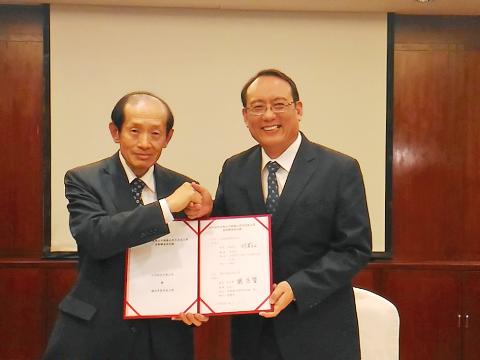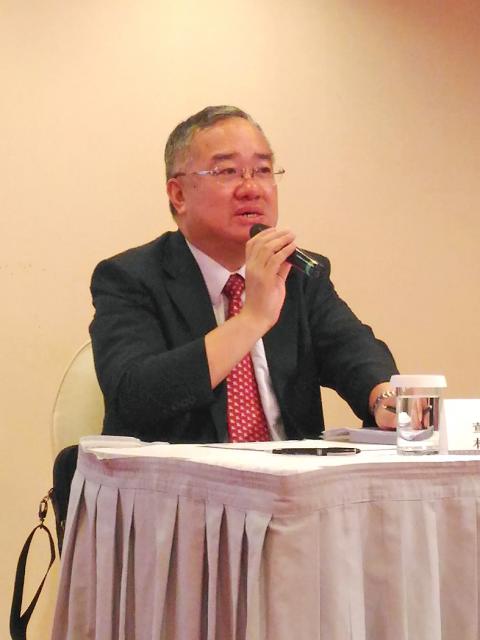A regulatory ruling yesterday on concerns about Chinese funds has dealt a setback to a group of investors seeking to gain control of Tatung Co (大同) in an ongoing management feud and proxy battle with the management team of the 99-year old company best known for its iconic electric rice cooker.
The Financial Supervisory Commission (FSC) announced that a number of stock purchases on behalf of Chinese clients by SinoPac Securities (Asia) Ltd (永豐金證券亞洲), a Hong Kong-based brokerage subsidiary of SinoPac Financial Holdings Co (永豐金控), breached rules governing cross-strait investments, as the purchases were not authorized.
In the run-up to a shareholders’ meeting next week, factions have been amassing stakes in a bid to capture board of directors seats.

Photo: Lee Ching-hui, Taipei Times
Local media reports said that about NT$2 billion to NT$3 billion (US$66.3 million to US$99.4 million) from China have been funneled to purchase Tatung shares on behalf of the activist investors.
Due to the ruling, the problematic shares do not confer voting rights, the commission said, although it declined to verify that the case involved Tatung shares.
Such revelations would lead to further market disruptions, the commission said.

Photo: Lee Ching-hui, Taipei Times
As a result of the diminished number of proxy votes, the activist investors’ plans to secure three out of the nine board seats have been thwarted, market observers said.
The commission said that the Chinese investors have been ordered to liquidate their stakes in Taiwanese companies within six months, while the Hong Kong-based brokerage’s Chinese clients would face fines of NT$600,000 in accordance with the Act Governing Relations Between the People of the Taiwan Area and the Mainland Area (臺灣地區與大陸地區人民關係條例).
SinoPac Financial would also be fined for the infraction as soon as next week, the commission said.
Tatung shares have swung wildly this year, peaking at NT$20.56 in February before retreating and closing at NT$10.75 yesterday.
The stock was languishing at about NT$5 in September last year, Taiwan Stock Exchange data showed.
Lin Hung-hsin (林宏信), chairman of a firm representing the activist investors, said that his faction would vote against capital increases and private placement proposals by the management team, as such moves would further harm shareholders’ interest by diluting shares.
Despite prolonged operating losses and an absence of dividend payouts since 2001 — as well as allegations of mismanagement, fraud and embezzlement — the management team led by Tatung’s founding Lin (林) family — which does not include Lin Hung-hsin — has continued to exert control over the company without regard for the interests of shareholders, he said at a news conference in Taipei yesterday.
Lin, who has previously rejected rumors about his ties to Chinese funds, said the fight with Tatung is not over for activist investors.
They would continue to increase their stakes in Tatung to prepare for the next board election in three years, he said.

The Central Election Commission has amended election and recall regulations to require elected office candidates to provide proof that they have no Chinese citizenship, a Cabinet report said. The commission on Oct. 29 last year revised the Measures for the Permission of Family-based Residence, Long-term Residence and Settlement of People from the Mainland Area in the Taiwan Area (大陸地區人民在台灣地區依親居留長期居留或定居許可辦法), the Executive Yuan said in a report it submitted to the legislature for review. The revision requires Chinese citizens applying for permanent residency to submit notarial documents showing that they have lost their Chinese household record and have renounced — or have never

A magnitude 5.6 earthquake struck off the coast of Yilan County at 12:37pm today, with clear shaking felt across much of northern Taiwan. There were no immediate reports of damage. The epicenter of the quake was 16.9km east-southeast of Yilan County Hall offshore at a depth of 66.8km, Central Weather Administration (CWA) data showed. The maximum intensity registered at a 4 in Yilan County’s Nanao Township (南澳) on Taiwan’s seven-tier scale. Other parts of Yilan, as well as certain areas of Hualien County, Taipei, New Taipei City, Taoyuan, Hsinchu County, Taichung and Miaoli County, recorded intensities of 3. Residents of Yilan County and Taipei received

Taiwan has secured another breakthrough in fruit exports, with jujubes, dragon fruit and lychees approved for shipment to the EU, the Ministry of Agriculture said yesterday. The Animal and Plant Health Inspection Agency on Thursday received formal notification of the approval from the EU, the ministry said, adding that the decision was expected to expand Taiwanese fruit producers’ access to high-end European markets. Taiwan exported 126 tonnes of lychees last year, valued at US$1.48 million, with Japan accounting for 102 tonnes. Other export destinations included New Zealand, Hong Kong, the US and Australia, ministry data showed. Jujube exports totaled 103 tonnes, valued at

BIG SPENDERS: Foreign investors bought the most Taiwan equities since 2005, signaling confidence that an AI boom would continue to benefit chipmakers Taiwan Semiconductor Manufacturing Co’s (TSMC, 台積電) market capitalization swelled to US$2 trillion for the first time following a 4.25 percent rally in its American depositary receipts (ADR) overnight, putting the world’s biggest contract chipmaker sixth on the list of the world’s biggest companies by market capitalization, just behind Amazon.com Inc. The site CompaniesMarketcap.com ranked TSMC ahead of Saudi Aramco and Meta Platforms Inc. The Taiwanese company’s ADRs on Tuesday surged to US$385.75 on the New York Stock Exchange, as strong demand for artificial intelligence (AI) applications led to chip supply constraints and boost revenue growth to record-breaking levels. Each TSMC ADR represents